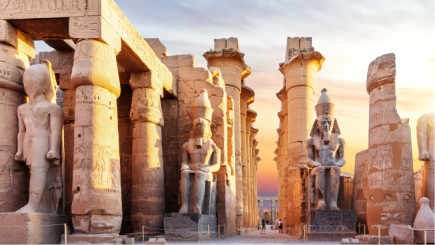
Learn Egyptian history with online courses and programs
Egyptian history explores the rich civilization of ancient Egypt, providing insights into its culture, society, and more. Build an understanding of how Egypt has shaped modern societies with online courses delivered through edX.

What is Egyptian history?
Egyptian history delves into the ancient civilization that thrived along the Nile River thousands of years ago. The field details the dynasties of pharaohs, construction of pyramids, hieroglyphic writing, and intricate religious beliefs centered around deities like Ra, Osiris, and Isis. Notable figures such as King Tutankhamun, Cleopatra, and Ramses II played significant roles in shaping Egypt's trajectory. Additionally, major events like the building of the Great Sphinx and the conquest of Egypt by Alexander the Great are studied to understand the dynamics of ancient Egyptian society.
The study of Egyptian history is crucial for understanding the foundations of human civilization. Beyond that, Egyptian culture has left an indelible mark on various aspects of modern life, including architecture, art, religion, and literature. Egyptology has also contributed to advancements in medicine, engineering, and agriculture.1
Immerse yourself in the field of Egyptology with online courses powered by edX.
Browse online Egyptian history courses
Related Topics
Egyptian history course curriculum
In an Egyptian history course, learners have the opportunity to explore a diverse range of topics, uncovering the accomplishments of the ancient civilization. Areas of study might include:
- The Nile River: Understanding the significance of the Nile River in shaping Egyptian civilization, including its role in agriculture, transportation, and religious beliefs.
- Pharaohs and dynasties: Exploring the different dynasties and rulers of ancient Egypt, including notable pharaohs such as Ramses II and Akhenaten.
- Religion and mythology: Examining the complex religious beliefs of ancient Egyptians, including their pantheon of gods and goddesses, religious rituals, and burial practices.
- Architecture and monuments: Studying the architectural achievements of ancient Egypt, such as the pyramids of Giza, temples like Karnak and Luxor, and the Great Sphinx.
- Hieroglyphics and writing: Discovering the ancient Egyptian writing system known as hieroglyphics and its role in preserving the history and culture of ancient Egypt.
- Daily life and society: Looking at the social structure, daily life, and roles of different individuals in ancient Egyptian society, with a focus on topics like family life, education, and craftsmanship.
- Trade and economy: Investigating the economic activities and trade networks of ancient Egypt, including the importance of resources like gold, precious stones, oils, and exotic goods.
- Art and culture: Learning about the unique art forms and cultural expressions of ancient Egypt, including sculptures, paintings, jewelry, and music.
With a wide range of courses, edX caters to professionals with diverse interests. A bachelor’s degree program introduces learners to their chosen field, be it history or anthropology, offering a comprehensive foundation of knowledge. For those seeking advanced learning, a master’s degree program delves into complex concepts, allowing for specialization if desired. While boot camps take less time to complete than traditional degree programs, they allow learners to hone career-critical skills. Executive education courses provide similar benefits in a condensed format.
Find the right learning path for you with edX.
Explore jobs that involve Egyptian history
Having knowledge of Egyptian history may open up various career opportunities in both academic and non-academic fields. Some job roles that individuals with expertise in Egyptian history may pursue include:
- Egyptologist: These professionals work in research institutions, museums, or universities, specializing in the study, preservation, and interpretation of ancient Egyptian culture, artifacts, and history.2
- Museum curator: These professionals work in museums or cultural institutions. There, they oversee the curation, conservation, and presentation of artifacts and historical materials related to Egyptian history.3
- Archaeologist: These professionals participate in excavations and research projects focused on uncovering and understanding ancient Egyptian sites, artifacts, and burial grounds.4
- Historian or educator: These professionals contribute to the academic field by conducting research, publishing scholarly works, and teaching at universities or colleges.5
- Tour guide: These professionals lead visitors through historical sites and provide detailed information about ancient Egyptian culture, monuments, and landmarks.6
- Cultural heritage manager: These professionals work in organizations dedicated to the preservation and promotion of cultural heritage. With knowledge of Egyptian history, a cultural heritage manager can contribute to the management and conservation of ancient Egyptian artifacts, sites, and cultural resources.7
- Cultural diplomat: These professionals are key in contributing to cultural exchange programs, diplomatic missions, and international collaborations related to Egypt's cultural heritage.8
- Consultant: These professionals may provide consultation services to media productions, documentaries, exhibitions, or cultural events centered around ancient Egypt, ensuring historical accuracy and authenticity.9
With expertise in Egyptian history, individuals can also pursue careers as writers, authors, or content creators, producing educational materials, books, articles, or digital content related to ancient Egypt for various platforms.
It's important to note that some positions within the field of Egyptology may require specific education, such as advanced degrees in history, archaeology, or related disciplines.
Expand your historical knowledge and refine your research and analytical skills with online Egyptian history courses powered by edX.
More opportunities for you to learn
We've added 500+ learning opportunities to create one of the world's most comprehensive free-to-degree online learning platforms.
Why Has Egypt Produced So Many Great Scientists? (2016). British Council. Retrieved on July 10, 2023.
Egyptology. Encyclopedia Britannica. Retrieved on July 10, 2023.
Archivists, Curators, and Museum Workers. (2022). U.S. Bureau of Labor Statistics. Retrieved on July 10, 2023.
Anthropologists and Archeologists. (2022). U.S. Bureau of Labor Statistics. Retrieved on July 10, 2023.
Historians. (2022). U.S. Bureau of Labor Statistics. Retrieved on July 10, 2023.
Tour Guides and Escorts. (2022). O*NET OnLine. Retrieved on July 10, 2023.
The Science of Preserving Egypt’s Cultural Heritage. (2014). Middle East Institute. Retrieved on July 10, 2023.
From Standing Out to Reaching Out: Cultural Diplomacy for Sustainable Development. (2022). UNESCO. Retrieved on July 10, 2023.
Qualities of a Great Cross-Cultural Consultant. Aperian Global. Retrieved on July 10, 2023.